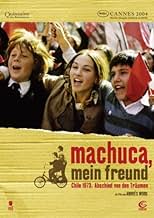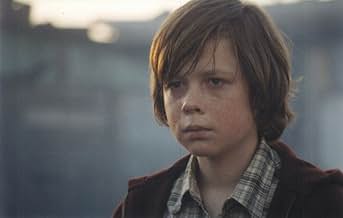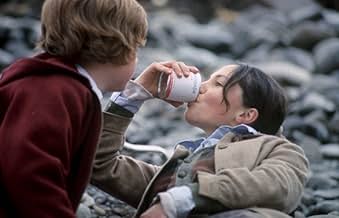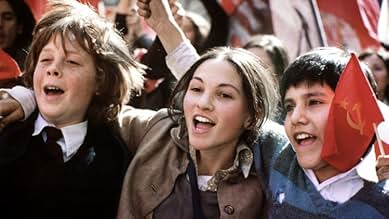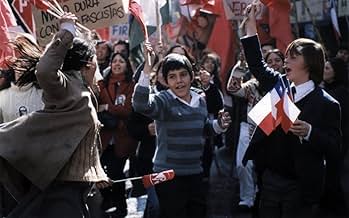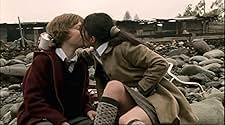AVALIAÇÃO DA IMDb
7,7/10
13 mil
SUA AVALIAÇÃO
Duas crianças chilenas de 12 anos de diferentes classes sociais tornam-se amigas em 1973. Ambos descobrem o mundo um do outro conforme as tensões políticas em seu país aumentam.Duas crianças chilenas de 12 anos de diferentes classes sociais tornam-se amigas em 1973. Ambos descobrem o mundo um do outro conforme as tensões políticas em seu país aumentam.Duas crianças chilenas de 12 anos de diferentes classes sociais tornam-se amigas em 1973. Ambos descobrem o mundo um do outro conforme as tensões políticas em seu país aumentam.
- Prêmios
- 13 vitórias e 7 indicações no total
Aline Küppenheim
- María Luisa Infante
- (as Aline Kuppenheim)
Daniel Alcaíno
- Sargento Ejército
- (as Daniel Alcaino)
Enredo
Você sabia?
- CuriosidadesAs stated by the director in several interviews, the movie was shot only on Sundays, due to its small budget.
- Erros de gravaçãoSilvana is standing by the outhouse, then moments later, after camera pans, appears on the other side of Gonzalo.
- Citações
Patricio Infante: Socialism might be better for Chile but not for us.
- Cenas durante ou pós-créditosIn the credits at the beginning of the film, the last letter of each word drifts slowly to the right separating from the names
- ConexõesFeatured in Sin maquillaje: Tamara Acosta (2013)
- Trilhas sonorasAi Amor
Written and performed by Buddy Richard
Avaliação em destaque
In 1973, the Chilean military, under the direction of General Augusto Pinochet and backed by the CIA, overthrew the shaky socialist government of democratically elected President Salvador Allende. The coup led to the murder of 3,000 leftist Allende supporters and the detention of an estimated 250,000 political prisoners. Set against the background of the political instability that led to the crisis, Andrés Woods' Machuca is the moving story of the friendship between two boys from different sides of the social spectrum. Voted the most popular film at the 2004 Vancouver Film Festival and a major box-office hit in Chile, the semi-autobiographical film succeeds on both a human and a political level, the different elements coming together in a final conflagration.
Gonzalo Infante (Matias Quer) is a chubby, red-faced 11-year old who attends St. Patrick's private school. He lives in a wealthy neighborhood where his security is unquestioned, even though he knows that his mother Maria (Aline Kuppenheim) is having a long-standing affair with a well-to-do Argentine businessman. Gonzalo is shy and inexpressive and is often bullied at school. His life changes, however, when Father McEnroe (Ernesto Malbran), the priest who runs the school, opens St. Patrick's to those who are unable to pay, and Gonzalo develops a friendship with Pedro Machuca (Ariel Mataluna), a youngster who lives in a nearby shantytown. The inclusion of the marginal students causes unrest at the school. Fights break out between the two economic classes and parents hastily call meetings to voice their opposition to the "communist" priest. Gonzalo protects Pedro from the bullies and later visits Pedro in his home.
Aware of how much he has, Gonzalo accepts his status without feeling superior, though Pedro's family refers to him as "the snob". In a subplot, Pedro's seductive young cousin Silvana (Manuela Martelli) gives both boys an introduction to sexual pleasure. Though the relationship between the two boys develops naturally and their innocence allows them to see past the developing turmoil, the disturbing layers of adult events slowly begin to threaten their friendship. To pick up some extra money, the boys attend political rallies and sell Chilean flags to both the Nationalists and the Communists, but soon emotions escalate and street fights break out between far-left and far-right militants. The onset of revolt is signaled by the arrival of two jets flying towards the Presidential Palace, a seminal event in Chile's history that marked the end of their democracy.
One of Chile's most successful young filmmakers, Woods lets the facts speak for themselves, and Machuca makes its points with an emotional power unencumbered by bias or simplistic messages. While the upper middle class is shown as elitist and disdainful of the working class, Pedro's family is also not portrayed in glowing terms. In a drunken rage of victimization, the father tells his son that in a few years, "He (Gonzalo) will be working for Daddy....You'll be cleaning toilets." The children are portrayed as simply children without the false glow of larger-than-life heroism. Although Machuca may ultimately have more of an impact for Chileans who experienced the coup directly, its theme of young people caught in the swirl of events beyond their understanding resonates far beyond the details of this single tragic moment in history.
Gonzalo Infante (Matias Quer) is a chubby, red-faced 11-year old who attends St. Patrick's private school. He lives in a wealthy neighborhood where his security is unquestioned, even though he knows that his mother Maria (Aline Kuppenheim) is having a long-standing affair with a well-to-do Argentine businessman. Gonzalo is shy and inexpressive and is often bullied at school. His life changes, however, when Father McEnroe (Ernesto Malbran), the priest who runs the school, opens St. Patrick's to those who are unable to pay, and Gonzalo develops a friendship with Pedro Machuca (Ariel Mataluna), a youngster who lives in a nearby shantytown. The inclusion of the marginal students causes unrest at the school. Fights break out between the two economic classes and parents hastily call meetings to voice their opposition to the "communist" priest. Gonzalo protects Pedro from the bullies and later visits Pedro in his home.
Aware of how much he has, Gonzalo accepts his status without feeling superior, though Pedro's family refers to him as "the snob". In a subplot, Pedro's seductive young cousin Silvana (Manuela Martelli) gives both boys an introduction to sexual pleasure. Though the relationship between the two boys develops naturally and their innocence allows them to see past the developing turmoil, the disturbing layers of adult events slowly begin to threaten their friendship. To pick up some extra money, the boys attend political rallies and sell Chilean flags to both the Nationalists and the Communists, but soon emotions escalate and street fights break out between far-left and far-right militants. The onset of revolt is signaled by the arrival of two jets flying towards the Presidential Palace, a seminal event in Chile's history that marked the end of their democracy.
One of Chile's most successful young filmmakers, Woods lets the facts speak for themselves, and Machuca makes its points with an emotional power unencumbered by bias or simplistic messages. While the upper middle class is shown as elitist and disdainful of the working class, Pedro's family is also not portrayed in glowing terms. In a drunken rage of victimization, the father tells his son that in a few years, "He (Gonzalo) will be working for Daddy....You'll be cleaning toilets." The children are portrayed as simply children without the false glow of larger-than-life heroism. Although Machuca may ultimately have more of an impact for Chileans who experienced the coup directly, its theme of young people caught in the swirl of events beyond their understanding resonates far beyond the details of this single tragic moment in history.
- howard.schumann
- 19 de dez. de 2004
- Link permanente
Principais escolhas
Faça login para avaliar e ver a lista de recomendações personalizadas
- How long is Machuca?Fornecido pela Alexa
Detalhes
- Data de lançamento
- Países de origem
- Central de atendimento oficial
- Idiomas
- Também conhecido como
- Мачука
- Locações de filme
- Empresas de produção
- Consulte mais créditos da empresa na IMDbPro
Bilheteria
- Orçamento
- US$ 1.500.000 (estimativa)
- Faturamento bruto nos EUA e Canadá
- US$ 26.676
- Fim de semana de estreia nos EUA e Canadá
- US$ 4.635
- 23 de jan. de 2005
- Faturamento bruto mundial
- US$ 3.187.700
- Tempo de duração1 hora 56 minutos
- Cor
- Mixagem de som
- Proporção
- 1.85 : 1
Contribua para esta página
Sugerir uma alteração ou adicionar conteúdo ausente



